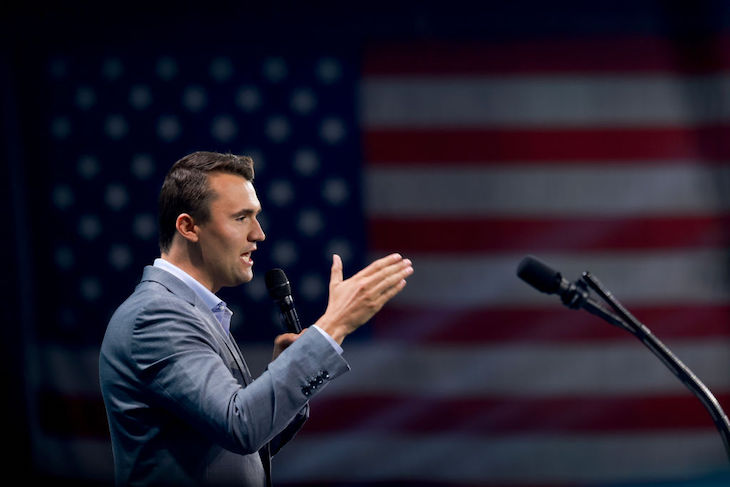As with so many political assassinations across the Atlantic – the Kennedys, Martin Luther King –Charlie Kirk’s killer is likely to be some deranged individual, a lone wolf driven by fevered delusions, perhaps, or a sick, mentally ill person. His murder, though, is anything but mundane. Kirk was not just another talking head; he was a phenomenon, a young firebrand, a brilliant, charismatic, honourable man who believed in discourse over violence, who repeatedly warned us that, when we stop talking with those we disagree with, civil wars start. That he was also a young husband and father, whose children will never get to know their dad, is heartbreaking.
Kirk helped drag conservatism into the digital age, making it accessible, shareable, and above all, youthful
Kirk stood out as a charismatic, relentless, natural orator who could command a room or a rally with equal ease. Through Turning Point USA, he mobilised thousands of young conservatives on college campuses, transforming what had been bastions of progressive orthodoxy into battlegrounds for ideas. Suddenly, being conservative did not mean being old, out of touch, or resigned to the slow march of history. It meant being bold, engaging, and yes, entertaining.
Some on the left saw the likes of Kirk as provocateurs, enablers of extremism, while the old guard on the right sometimes viewed them as upstarts diluting the purity of conservative doctrine. But Kirk’s impact was undeniable. He helped drag conservatism into the digital age, making it accessible, shareable, and above all, youthful.
Kirk’s trajectory bore striking resemblances to that of Edgar Graham, the brilliant young academic lawyer from Northern Ireland whose life was cut short in the 1980s. Both were in their prime –Graham was just 29 when he was gunned down, Kirk, 31, just a few years older – men who embodied the promise of intellectual vigour in the service of their causes.
Graham, a lecturer at Queen’s University Belfast and a rising star in the Ulster Unionist Party, believed fervently in the non-violent exchange of ideas. He debated with eloquence and empathy, advocating for civil rights within the framework of the Union, challenging the sectarian hatreds that plagued his homeland.
Kirk, too, was a debater at heart, thriving on the cut and thrust of public forums. Whether facing off against hostile audiences on university quads or sparring with journalists on cable news, he championed free markets, personal responsibility and traditional values without descending into demagoguery. Both were lost leaders, figures whose potential to reshape their nations’ futures was extinguished before it could fully ignite.
The parallels extend to the fears they inspired in their adversaries. The fascist Provos – the Provisional IRA – were terrified of Edgar Graham. His brains, his brilliance, his unshakeable humanity represented a mortal threat to their violent ideology. The idea that such a man might one day lead unionism, bridging divides with reason rather than rifles, was unthinkable.
So, they murdered him, just as they had assassinated Robert Bradford, the Methodist minister and Unionist MP, a few years earlier. Bradford, like Graham, was a voice of moderation and moral clarity in a time of terror.
As the great Sunday Independent journalist and polemicist Eoghan Harris wrote after Bradford’s killing, ‘the IRA’s plan was to blow the brains out of unionism’. It was a chilling phrase, capturing the strategy of eliminating not just bodies, but the intellectual foundations of an opposing movement. By targeting the brightest minds, the terrorists sought to decapitate their enemies, leaving behind a vacuum filled with fear and lesser lights.
One cannot help but wonder if a similar calculus lay behind Kirk’s assassination. In an America polarised to the point of fracture, Kirk was a formidable force. He was a natural organiser, dropping out of university at 18 to work full-time in politics. He started with the Tea Party movement; his relentless energy, hard work, passion and innate decency, coupled with genuine, deep Christian beliefs, made him stand out in a movement with many stars.
At a young age, he endlessly impressed with his work ethic and morals. He founded Turning Point USA, which has grown into a powerhouse, with chapters across the country, influencing elections and shaping the Republican Party’s youth wing. His alliances with figures like Donald Trump amplified his reach, turning him into a kingmaker among the MAGA faithful. Yet Kirk’s appeal transcended mere partisanship. He spoke to the disaffected, the left behind, the working-class voters weary of elite condescension, the students chafing against campus censorship.
His Christianity was not ornamental but integral, informing his stances on life, liberty and the pursuit of happiness. In a secularising society, he reminded conservatives that faith could be a source of strength, not embarrassment. There is no doubt in my mind that Charlie Kirk would have one day run for president. The signs were all there: his national profile, his fundraising prowess, his ability to rally crowds that rivalled those of seasoned politicians. At a time when the Republican Party grapples with its identity – torn between isolationism and intervention, populism and principle – Kirk could have been the synthesis. Young enough to connect with millennials and Gen Z, experienced enough to navigate Washington, he might well have won. Imagine a Kirk presidency: a return to economic dynamism, a robust defence of borders and values, perhaps even a cultural renaissance rooted in Judeo-Christian ethics.
His critics would decry it as reactionary, but to his supporters, it would have been restorative – an end and a bulwark against the puritanic petty excesses of wokeness, the nation-state at the centre of everything and globalism pushed back. Yet now he is gone, another name etched into the annals of political tragedy.
The void he leaves is profound. In Northern Ireland, the murders of Graham and Bradford prolonged the agony of the Troubles, delaying the intellectual renewal that might have hastened peace. In America, Kirk’s death risks a similar stagnation for conservatism. The movement he helped invigorate may splinter, with the old guard reclaiming the reins, or the fringes descending into nihilism. Who will now inspire the next generation to debate rather than demonise, to build rather than burn?
Kirk was our avatar for the 21st century – witty, resilient, unafraid
I am fourteen years older than Charlie Kirk, which places me in a generation that watched the conservative movement evolve from the staid, establishment figures of yesteryear to the vibrant, irreverent voices that now dominate the discourse. Until my mid-thirties, conservatism still evoked images of grey-suited patricians, or talk radio giants like Pat Buchanan with his fiery isolationism. Conservatism was John Major plodding through the corridors of Whitehall with his understated pragmatism, or George W. Bush, whose folksy Texan drawl masked a worldview shaped by neoconservative certainties. Men and women of institutions, of party machines and policy papers, but above all, men and women of a certain age.
From the measured tones of Major’s one-nation Toryism and talk radio conservative firebrands more redolent of Ian Paisley than Burkean Conservatism, the Right has adapted and grown. Its leaders are as intellectually diverse as they are racially: from Kemi Badenoch to JD Vance to Ben Shapiro to Ben Carson. The right has comedians again; it has celebrities once more. This was unimaginable 20 years ago.
Kirk was our avatar for the 21st century – witty, resilient, unafraid. His detractors painted him as a grifter or a provocateur, but those who knew his work could feel his commitment: to empowering the overlooked, the left behind, and above all, to defend personal freedoms that have long been under siege. In death, he joins the pantheon of what-ifs – leaders felled before their prime, their potential a haunting reminder of fragility.
America, like Northern Ireland before it, must now reckon with this act of barbarism. Will it spur a recommitment to civil debate, or accelerate the slide into tribalism? The answer lies with those he inspired: young conservatives, black conservatives, Hispanic conservatives, working-class conservatives. They must carry his torch forward. In the end, ideas endure longer than assassins’ bullets.







Comments